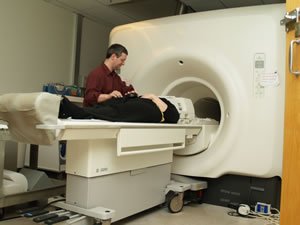 Loss of concentration, difficulty remembering, difficulty thinking clearly — all are signs of a phenomenon cancer patients call “chemo brain.” Now researchers are looking at the cognitive changes that occur in the brain during chemotherapy to determine what causes chemo brain and how patients can compensate for these challenges.
Loss of concentration, difficulty remembering, difficulty thinking clearly — all are signs of a phenomenon cancer patients call “chemo brain.” Now researchers are looking at the cognitive changes that occur in the brain during chemotherapy to determine what causes chemo brain and how patients can compensate for these challenges.
Cancer
 More people in the U.S. are living longer after a cancer diagnosis. For this increasing number of cancer survivors, living a better quality of life is just as important as living through the disease. Improving communication and acknowledging stress can enhance the quality of life of cancer survivors and those who support them.
More people in the U.S. are living longer after a cancer diagnosis. For this increasing number of cancer survivors, living a better quality of life is just as important as living through the disease. Improving communication and acknowledging stress can enhance the quality of life of cancer survivors and those who support them.
“Connecting with others can be vital to effectively adapt to what many term as a ‘new normal’,” said Frances A. Zandstra, RN, OCN, director of the Cancer Survivorship Program at The University of Texas M. D. Anderson Cancer Center. [continue reading…]
Breast cancer patients who have a prior history of mood and anxiety disorders are at a much higher risk of experiencing posttraumatic stress disorder following their diagnosis, new research suggests.
A study of 74 breast cancer patients at the Ohio State University Medical Center found that 16 percent of them (12 women) suffered from PTSD 18 months after diagnosis. [continue reading…]
Study suggests a single 20-minute writing session positively impacts a patient’s quality of life
Expressive writing –writing about one’s deepest thoughts and feelings—may help change the way cancer patients think and feel about their disease. In one of the first studies published in an oncology journal about the benefits of writing therapy, researchers say those who immediately reported changes in thoughts about their illness also reported a better physical quality of life three weeks later.
“Previous research suggests expressive writing may enhance physical and psychological well-being,” said Nancy P. Morgan, M.A., writing clinician and director of the Lombardi Comprehensive Cancer Center’s Arts and Humanities Program. “But most of those studies involved three to five writing sessions that were conducted in a controlled laboratory setting. Here, we found that just one writing session in a busy cancer clinic where the patients are frequently interrupted can still have a positive impact on patients.” The study appears in the February issue of The Oncologist. [continue reading…]
